
Mexico offers retirees safety, affordability, warm weather, and excellent healthcare. Top spots include Merida, Ajijic, Puerto Vallarta, and Mazatlán.
Whether you want beach living, city amenities, or cultural immersion, there's a perfect match for your retirement dream.
Retiring in Mexico is not only possible, it’s popular. With U.S. costs rising and visa restrictions tightening elsewhere, Mexico offers an unmatched combination of affordability, climate, culture, and legal pathways to live there full or part-time.
But the right place to retire depends on your goals, identity, and lifestyle.
Perhaps you're reconnecting with your Mexican roots, planning a peaceful coastal retirement, or securing dual citizenship for your kids’ future. There’s a perfect spot in Mexico for you.
And if legal barriers like birth certificate issues, consulate rejections, or bureaucratic delays are standing in your way, many have faced the same challenge.
That is precisely what Doble Nacionalidad Express was built to solve.
If you're ready to explore where to retire, and how to do it legally and confidently, this guide walks you through everything.
Let’s get started.
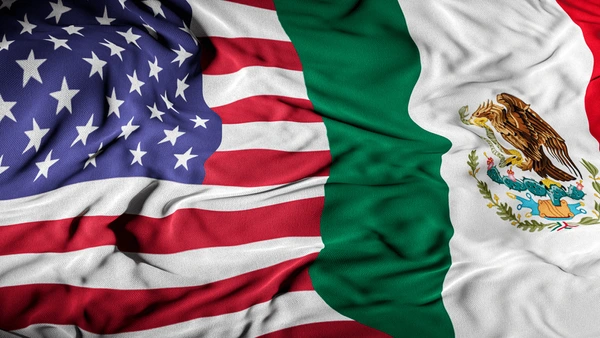
Why Mexico? The Dream Retirement That’s Actually Doable
If you’ve been eyeing retirement but feel priced out of the U.S., you are in good company.
Every year, more Americans are making the leap to Mexico, and not for the sunsets alone.
They're choosing Mexico because it’s one of the few places where retirement still feels like retirement. Here’s why:
Lower Cost of Living Than the U.S.
A comfortable retirement in the U.S. can easily run over $4,000 a month, before healthcare.
In Mexico, many expats report living well on $1,800–$2,500/month as a couple. According to cost of living comparisons, housing in the U.S. is over 160% more expensive than in Mexico. In smaller cities, even $1,000–$1,500 is realistic with modest adjustments.
Everything from rent and groceries to home services (like cleaning or gardening) costs significantly less.
Because you’re not paying U.S.-level premiums for everyday life, you can afford more of what makes retirement enjoyable, like dining out, travel, and leisure.
World-Class, Affordable Healthcare
Mexico is a haven for quality medical care.
English-speaking specialists, modern hospitals, and prescription access make it easy to transition. Consultations often cost $20–$50 USD, and surgeries can be done at a fraction of U.S. prices.
Here’s what many don’t realize: With residency or citizenship, you can also access public healthcare systems like IMSS, making coverage even more affordable.
That’s a major advantage over simply staying on a tourist visa.
Warm Weather Year-Round
From the sunny beaches of Baja to the eternal spring of Ajijic, you can pick your climate in Mexico.
Hate the cold? Choose Merida or Playa del Carmen.
Want cool nights and sunny days? Head to San Miguel de Allende or Lake Chapala.
Mexico’s diverse geography makes it easy to find your ideal weather, without hurricanes, snowstorms, or sweltering humidity if you know where to look.
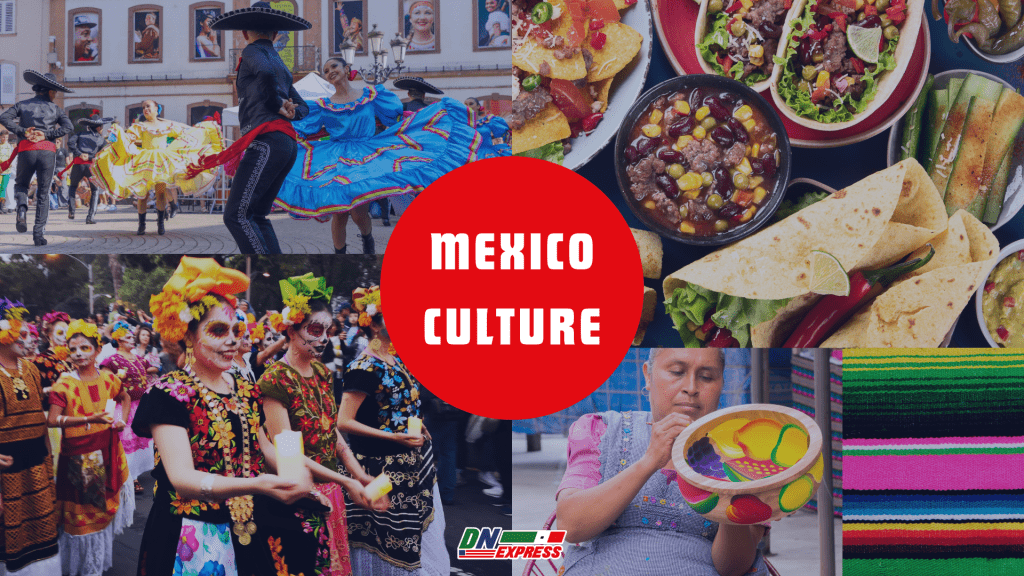
Friendly Communities & Strong Expat Networks
The phrase “you’re not alone” means something here.
Cities like Puerto Vallarta, Ajijic, and San Miguel de Allende are home to tens of thousands of American and Canadian retirees who’ve already paved the way.
Need a doctor recommendation? Want to know which bank is easiest for foreigners? In these towns, there’s likely a Facebook group or a resource like Mexperience with people ready to help.
Still, integration involves joining a Mexican community too.
Learning some Spanish, even basic phrases, makes a huge difference in feeling connected, respected, and at home.
Great Food, Vibrant Culture, and Rich Heritage
From street tacos and tamales to fine dining with local wines, Mexico’s food scene is part of its magic.
But culture goes beyond cuisine. Retiring here means immersing yourself in centuries of art, architecture, music, and festivals, information about which can be found on the Secretary of Tourism's official site.
For U.S.-born Mexicans reconnecting with their roots, this is about restoring a sense of belonging.
A Quick Legal Note: If you’re considering a move, keep in mind that residency and citizenship unlock serious benefits, from legal home ownership and public healthcare to inheritance rights for your children.
If you’ve faced paperwork issues, rejections, or don’t know where to start, Doble Nacionalidad Express can help you navigate it all remotely, no consulate visit needed.
What’s the Best Place to Retire in Mexico? It Depends on You
Choosing the “best” place to retire in Mexico is not about finding one perfect city. It’s about finding your perfect fit.
Mexico has something for everyone, whether you're seeking vibrant beach life, eternal spring weather, top-tier healthcare, or peace and quiet by the sea.
Here’s a lifestyle-based guide to help you match your retirement dreams to the right destination:
Beach Lovers
If waking up to ocean views, warm breezes, and sand between your toes is your dream, Mexico’s coastline delivers.
- Puerto Vallarta: One of Mexico’s most LGBTQ+ inclusive cities, PV is walkable, energetic, and full of nightlife, yoga studios, and gourmet dining. It’s pricier than nearby towns but offers comfort and community.
- Playa del Carmen: Located on the Caribbean coast, Playa is trendy and Instagram-friendly with beach clubs, snorkeling, and easy access to Cozumel. It's popular among younger retirees and digital nomads.
- Mazatlán: If you want beach access without high costs, Mazatlán offers historic charm, authentic food, and fewer crowds. It’s a favorite for retirees looking for value and vibrancy.
Pro Tip: If you’re considering owning beach property, dual citizenship eliminates fideicomiso restrictions near coastlines, something to keep in mind if you plan to buy.
Mild Weather & Nature
Hate humidity? Prefer cooler nights and sunny days? These inland towns offer natural beauty and spring-like weather year-round.
- Ajijic / Lake Chapala: Known for its “eternal spring” climate, Ajijic boasts the largest U.S. and Canadian expat community in Mexico. Expect English-speaking doctors, plenty of events, and easy socializing.
- San Miguel de Allende: Famous for its colonial architecture and artist culture, SMA attracts retirees who love art, history, and charm. The cost of living is higher but it is rich in culture.
- Querétaro: This rising star offers a clean, organized city with top hospitals, modern amenities, and fewer tourists. A good choice if you want balance without expat overload.
Heads Up: Some retirees report emotional adjustment stress in quieter towns without expat groups. Rent before you commit.
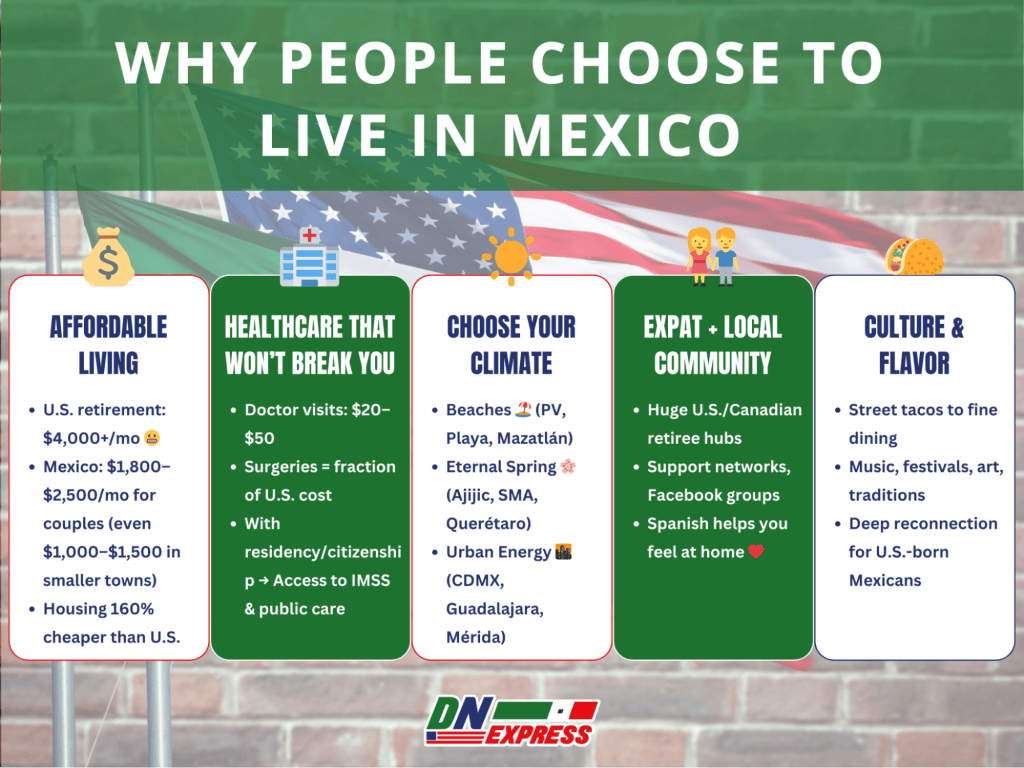
City Access & Healthcare
For retirees who want excellent medical care, public transit, and cultural immersion, these cities offer everything in one place.
- Merida: Often called the safest city in Mexico, Merida combines colonial beauty with modern infrastructure. It’s ideal for those who want a peaceful, culturally rich retirement, and top-tier healthcare.
- Mexico City: Retiring in the capital means full access to Mexico’s best hospitals, endless entertainment, and international flights. It’s fast-paced and urban, perfect for those who want energy.
- Guadalajara: A hub for music, art, and world-class medicine, Guadalajara has everything from symphonies to skilled surgeons. The city is large but less chaotic than Mexico City.
Question Answered: Yes, temporary residents can access public healthcare, but full benefits often require permanent residency or dual citizenship.
Underrated Coastal Towns
Skip the crowds and overpriced condos. These coastal gems are peaceful, affordable, and still well-connected.
- La Paz: A Baja beauty with clear waters and relaxed vibes, La Paz is perfect for low-key retirees who want beauty without tourism chaos.
- Progreso: Only 30 minutes from Merida, Progreso offers beach access on a budget. Great for seasonal residents who want peace and proximity to healthcare.
- Bucerías: Next to Puerto Vallarta but quieter and more affordable, Bucerías blends the best of both worlds: a beach lifestyle with small-town calm.
Caution: Not every “cheap beach town” has good infrastructure. Check internet speeds and healthcare access before settling in.
Still Not Sure Where to Retire? Start by visiting two or three cities short-term. Many retirees fall in love with a place they never considered.
Remember: If legal paperwork or document errors are blocking your plans, Doble Nacionalidad Express can help you correct them and secure the residency or citizenship that unlocks genuine peace of mind.
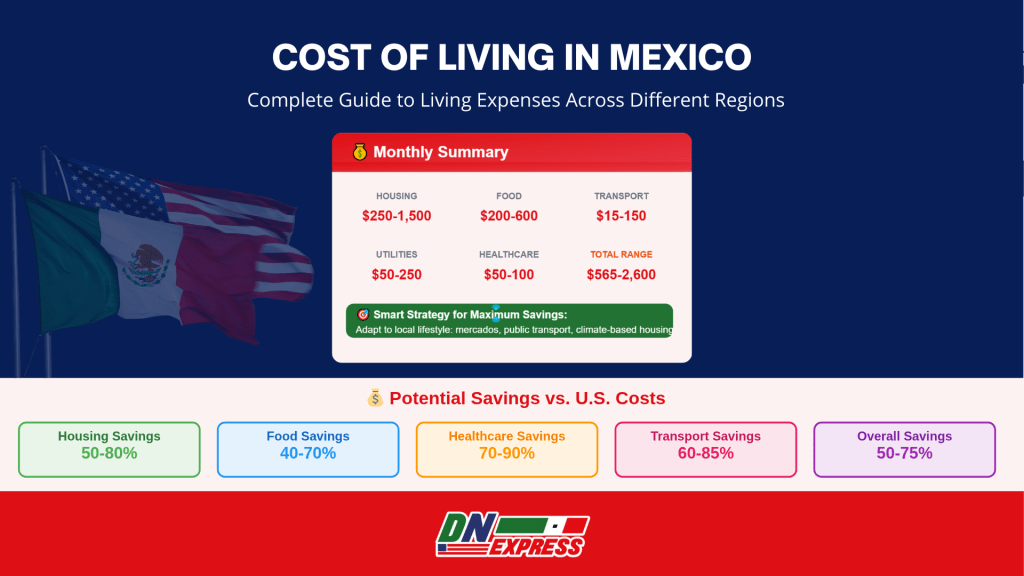
What Retirees Wish They Knew Before Moving to Mexico
Even with the best planning, some lessons only become clear after you’ve landed.
Whether you’re looking for sunshine or savings, here’s what many seasoned retirees say they wish someone had told them earlier:
“Don’t Research from Your Couch. Go Visit!”
No blog, video, or cost-of-living chart can replace the experience of walking the streets, talking to locals, and shopping at actual markets.
What looks dreamy online might feel isolating in person.
Tip: Plan a trial stay of at least 30–60 days in any city you're considering. Rent a modest apartment, try public transportation, and live like a local.
“Healthcare Access Depends on Residency. Don’t Wait to Apply”
If you're on a tourist visa, you’ll pay out-of-pocket or need private insurance.
But residency or citizenship unlocks access to Mexico’s public healthcare systems, including IMSS. Waiting too long to apply can delay your access to needed services.
Tip: Begin your residency or dual citizenship process before a medical emergency happens. If you’re eligible through Mexican heritage, Doble Nacionalidad Express can help you apply remotely, without ever stepping foot in the consulate.
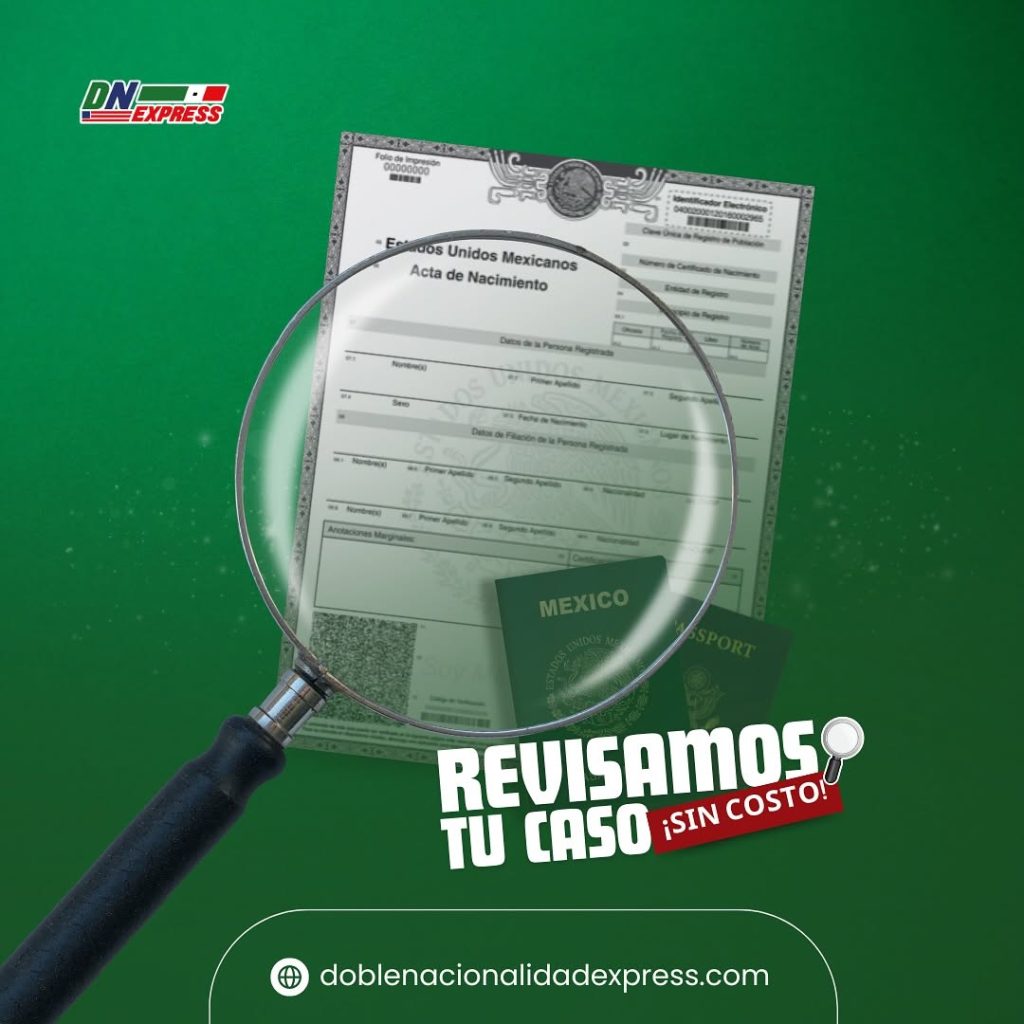
Why DIY Can Derail Your Retirement Dreams
Moving to Mexico is not solely about finding the perfect place. It’s about doing it legally.
Too many people try to handle it alone, only to get caught in paperwork nightmares, consulate delays, or denied applications that could have been easily avoided.
If you’re thinking of doing it yourself, here’s what you need to know first:
Legal Pitfalls of Going It Alone
It’s easy to think dual citizenship or permanent residency requires a few forms and some patience.
In reality, the system is stacked against you, especially if you’ve never navigated Mexican bureaucracy before.
Small errors on birth certificates can void your entire application. A missing accent or mismatched surname can be enough for the registry to reject your paperwork, months after submission.
Many retirees are denied for incorrectly proving “solvencia económica.” If you're applying for residency based on income or savings, there are strict rules about documentation, timing, and amounts.
Many get denied simply for submitting the wrong type of account statement.
Consulate backlogs can delay your retirement plans for months (or years). Some consulates are so backed up that people wait over 12 months for an appointment, only to be told they’re missing a document.
These issues don’t waste time. They can derail property purchases, health insurance plans, and even your ability to stay in Mexico legally long-term.
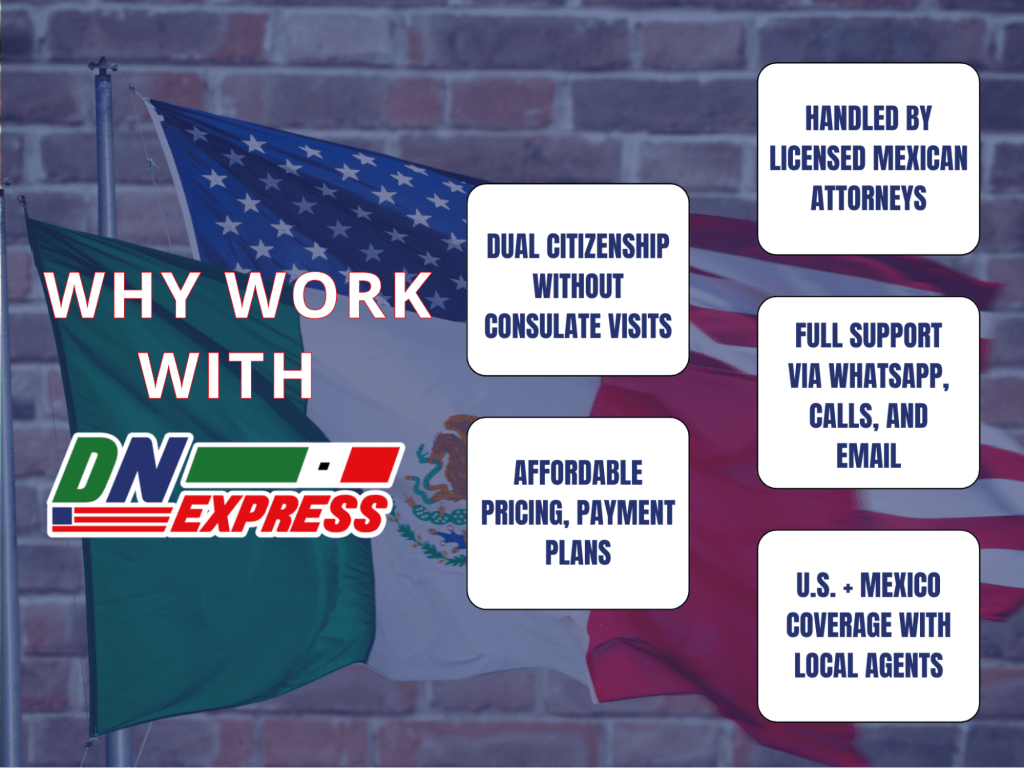
Why DNExpress Is Your Best Move
I started Doble Nacionalidad Express because I’ve seen too many families stuck in this exact situation. People trying to reconnect with their heritage or retire peacefully, blocked by paperwork, confusion, or inconsistent rules.
We solve that.
No consulate visits required for most dual citizenship or registry services; we handle it remotely.
Licensed, bilingual attorneys guide you through every step. No guesswork.
Genuine legal strategy, not document filing. We resolve issues like birth certificate errors, name mismatches, or unregistered births.
Flat-fee pricing means no surprise costs, and no chasing down notaries in two countries.
Bonus: With citizenship, you can own coastal land outright, skip residency renewals, and gain access to IMSS public healthcare in Mexico.
For people born in the U.S. to Mexican parents, those marrying Mexican citizens, or even retirees looking to naturalize, this is the moment to get it right.
Because retirement shouldn’t be about navigating red tape. It should be about enjoying your life, legally and fully.
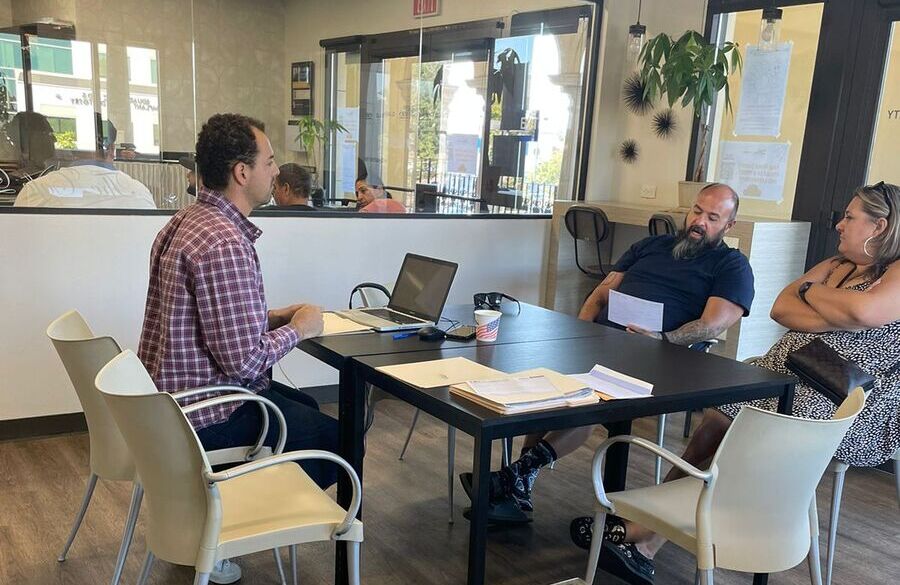
How to Take the First Step
If you’ve made it this far, it’s not about finding the best place to retire; it’s about making it happen.
And that starts with the right legal foundation.
Whether you’re beginning to explore dual citizenship or have already been rejected by a consulate, here’s how we help you move forward with clarity and confidence:
- Schedule a Free Case Review. Get personalized legal insight, without pressure or cost. Our team will review your situation, documents, and goals to map out the best path forward.
- Fix Birth Certificates and Registry Issues. Missing accents? Incorrect names? Unregistered births? We handle these complicated problems every day, so you don’t have to.
- Apply for Dual Citizenship, Remotely. No travel, no consulate lines. We process your application from anywhere in the U.S., with licensed attorneys who know how to get results.
- Retire with Peace of Mind, Not Paperwork Stress. From buying a home to accessing healthcare or passing down property to your kids, legal status matters. We make sure you have it.
If you’ve been waiting for a sign to move forward, this is it.
Your retirement shouldn’t be delayed by legal confusion or denied applications.
Retirement Is Better In Mexico

Retiring in Mexico is not about giving something up. It’s about getting something back: your time, your freedom, your peace of mind.
Whether you're drawn by family roots, lower costs, or a slower pace of life, Mexico offers a great deal of affordability.
It offers a life worth living.
But dreams are fragile when they rest on shaky legal ground.
If you want your retirement to feel like a reward, not a struggle, start by securing your legal rights in Mexico.
That means fixing paperwork, gaining citizenship, and unlocking the benefits that come with doing it the right way.
We help people like you every day; people who thought they missed their chance, didn’t qualify, or were too overwhelmed to try.
We’re a service that does a lot. We’re your advocates, your bridge between countries, and your partner in building a future that honors where you come from and where you’re going.
We do this because we believe no one should be denied the right to feel at home on both sides of the border.
If you’re ready, we’re ready. Let’s build your retirement dream, legally and with heart.
Book a Free Consultation now, or Message Us on WhatsApp, it will be a pleasure to help you on the road to your dual nationality.
FAQ
If you’re serious about retiring in Mexico, you’ve likely got questions. Below are the most frequent and critical questions we hear from future retirees, along with genuine, experience-backed answers to guide your next move. You can find more answers in our frequently asked questions section.
What Is the Safest Place to Retire in Mexico?
Merida takes the top spot, year after year. This Yucatán capital is known for its low crime rate, strong police presence, and peaceful neighborhoods. It also offers modern amenities, great healthcare, and a growing expat scene, without the chaos of bigger cities.
How Much Money Do You Need to Retire Comfortably?
Most expat couples live well on $1,800 to $2,500 USD/month, which typically covers rent, food, healthcare, utilities, and even some travel. In less-touristy areas, that number drops to $1,200–$1,500/month with a modest lifestyle.
Budget Tip: Choosing local markets and rentals over expat-priced options can stretch your budget even further.
Where Is the Cheapest and Safest Place?
Mazatlán is an often-overlooked winner. It combines low rent, walkability, great street food, and beach access, all with a strong reputation for expat safety. It’s more authentic than Cancun and less crowded than Puerto Vallarta.
Where Do Most U.S. Citizens Retire?
The top picks are:
- Ajijic – for its massive English-speaking community and year-round good weather
- San Miguel de Allende – for culture, art, and cobblestone charm
- Puerto Vallarta – for the beach life with U.S.-level amenities
These cities offer a social safety net, easy networking, and services catered to expats.
How Much Does It Cost to Live in Bucerías?
Located outside Puerto Vallarta, Bucerías is quieter but still coastal. Expect to pay around $2,000/month for two people, including rent, dining, and local transport. It’s great for those who want proximity to PV without the party scene.
What Are the Downsides of Retiring in Mexico?
Retirement in Mexico has its challenges:
- Language Barriers: Spanish is necessary outside expat zones.
- Climate Extremes: Some areas are hot and humid year-round.
- Bureaucracy: Paperwork and slow government systems can frustrate.
- Healthcare Gaps: Top-tier care is in cities; not all towns have specialists.
Mental Health Note: Some expats report emotional strain during their first year. Isolation, especially in non-expat towns, can be tough without a support system.
What City Has the Best Medical Care?
Mexico City and Guadalajara are medical tourism hubs with world-class hospitals, bilingual doctors, and specialized care. From oncology to cardiology, you'll find advanced treatment options and quick appointments.
Need Public Coverage? You'll need permanent residency or dual citizenship to access public healthcare like IMSS.
Does Mexico Tax U.S. Retirement Income?
Generally, Mexico does not tax U.S. retirement income such as Social Security, 401(k)s, or pensions. Only income earned in Mexico is taxable. Still, we recommend consulting a bilingual accountant familiar with both systems.
Legal Edge: Dual citizens benefit from the U.S.-Mexico tax treaty, which prevents double taxation on retirement income.
What’s the Nicest, Safest Place Overall?
It’s subjective, but two places consistently top the charts:
- Merida – for safety, infrastructure, and calm living
- Ajijic – for climate, community, and English-speaking services
The best fit depends on your goals, budget, and comfort with language and culture.



